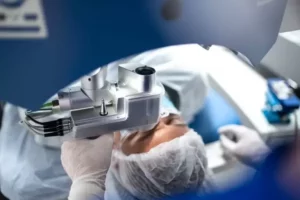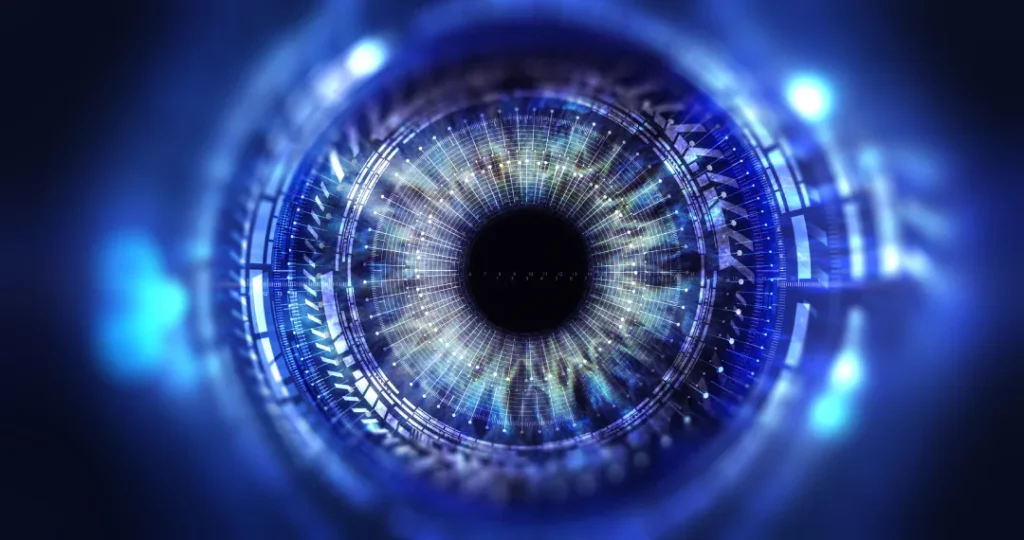Imagine waking up one morning, opening your eyes and seeing everything in perfect clarity, without reaching for your glasses or inserting contact lenses. Sounds like a dream, right? Well, Contoura Vision, a transformative eye procedure designed to correct refractive errors and potentially elevate your vision beyond the ordinary. But how does it work? Let’s dive in and learn about the ins and outs of Contoura Vision.
Contents
- 1 What is Contoura Vision Procedure?
- 2 Understanding the Contoura Vision Procedure
- 3 What to Do Before Contoura Vision Surgery?
- 4 Requirements for Contoura Vision Procedure
- 5 Is Contoura Vision Surgery Painful?
- 6 Possible Risks of Contoura Vision
- 7 How to Take Care After Contoura Vision Procedure?
- 8 Conclusion
What is Contoura Vision Procedure?
 Contoura Vision is a unique and revolutionary eye surgery. It is a type of LASIK (Laser-Assisted In Situ Keratomileusis) treatment that’s tailored to your eyes. Unlike traditional LASIK procedures that primarily correct your eye’s general shape, Contoura Vision goes a step further. It uses advanced technology to map out the unique contours of your cornea, the clear front surface of your eye, and then precisely corrects these minute irregularities.
Contoura Vision is a unique and revolutionary eye surgery. It is a type of LASIK (Laser-Assisted In Situ Keratomileusis) treatment that’s tailored to your eyes. Unlike traditional LASIK procedures that primarily correct your eye’s general shape, Contoura Vision goes a step further. It uses advanced technology to map out the unique contours of your cornea, the clear front surface of your eye, and then precisely corrects these minute irregularities.
Understanding the Contoura Vision Procedure
The Contoura Vision procedure is a precise, detailed process that utilizes top-notch technology and expertise. It is completed in a few steps that are carefully designed to ensure your eyes are correctly treated. Here is a simplified, step-by-step breakdown:
Step 1: Preoperative Examination
Before diving into the procedure, your eye doctor will conduct a detailed preoperative examination. This includes a comprehensive eye examination and the creation of a unique ‘map’ of your cornea using a special device. This map will guide the laser in your treatment.
Step 2: Preparing Your Eye
On the day of the surgery, your eye will be numbed using eye drops to ensure a painless experience. Once your eye is numb, a device called a lid speculum will be used to keep your eyelids open.
Step 3: Creating the Corneal Flap
Your surgeon will then create a thin flap in the cornea using a precise instrument or a laser. This flap is gently lifted to allow the laser to reshape your cornea.
Step 4: Reshaping the Cornea
Guided by the unique map of your cornea, a specific laser will be used to carefully reshape the cornea. This step corrects the tiny irregularities causing your vision problems.
Step 5: Flap Repositioning
Once your cornea has been reshaped, the flap that was lifted at the start of the procedure is carefully put back into place. The flap naturally adheres to the underlying cornea, so no stitches are needed.
Step 6: Postoperative Care
After the surgery, your surgeon will provide you with detailed instructions for care, including using prescribed eye drops and attending follow-up appointments.
The beauty of Contoura Vision is that it offers quick recovery and minimal discomfort. Most patients can return to their routine the next day, and they start noticing improvements in their vision within a day or two.
What to Do Before Contoura Vision Surgery?
Before you undergo Contoura Vision surgery, there are certain preparations to ensure the best possible results. Here’s a quick guide to what you should do before the procedure:
- Your eye surgeon will conduct a comprehensive eye examination.
- If you wear contact lenses, you’ll need to switch to glasses a few weeks before the procedure.
- Ensure you maintain good eye hygiene leading up to the surgery. This includes not using eye makeup, creams, or lotions for at least a day before surgery to reduce the risk of infection.
- Since you won’t be able to drive immediately after the procedure, make sure to arrange for someone to drive you home.
- Usually, you’ll be asked to abstain from eating or drinking after midnight on the day of your surgery.
Requirements for Contoura Vision Procedure
Contoura Vision is a groundbreaking procedure with the potential to significantly improve vision. However, it’s not suitable for everyone. Tthere are certain criteria that need to be met. Here’s a quick look at those requirements:
- Age Requirement – Individuals should be at least 18 years old for the procedure. This is because younger people often have eyes that are still changing and developing.
- Stable Prescription – Your prescription needs to have been stable for at least a year before the surgery. If your eyesight is still changing significantly, the surgery may not give long-lasting results.
- Thickness of Cornea – The thickness of your cornea matters. You need to have a sufficiently thick cornea to allow a flap to be safely created and reshaped.
- Overall Eye Health – The overall health of your eyes is important too. If you have conditions like glaucoma, keratoconus, dry eyes, or any active eye infections or inflammations, then this procedure may not be suitable for you.
- General Health – Certain systemic diseases and conditions like diabetes, rheumatoid arthritis, and lupus, among others, can affect healing and may make you an unsuitable candidate for the surgery.
- Pregnancy or Nursing – If you’re pregnant or nursing, your hormones may be affecting your vision. It’s generally recommended to wait until hormone levels return to normal before considering the procedure.
Is Contoura Vision Surgery Painful?
When it comes to any form of surgery, one of the most common questions is: Will it hurt? The good news is, Contoura Vision surgery is typically not painful.
Before the surgery begins, numbing eye drops are applied to the eye to prevent any discomfort. You might feel slight pressure or a mild sensation of touch during the procedure, but it’s usually not painful. The process is swift, with the laser treatment itself lasting only a few minutes per eye.
After the surgery, some patients may experience mild discomfort, dryness, or sensitivity to light for a short period.
Possible Risks of Contoura Vision
 While Contoura Vision is an advanced and safe procedure, like all surgeries, it is not completely devoid of risks. Here are some of the possible complications associated with Contoura Vision:
While Contoura Vision is an advanced and safe procedure, like all surgeries, it is not completely devoid of risks. Here are some of the possible complications associated with Contoura Vision:
- Dry Eyes – Some people may experience dry eyes after surgery. This is usually temporary and can be managed with artificial tears and other medications.
- Visual Disturbances – There could be temporary visual disturbances such as glare, halos around lights, or difficulty driving at night. These are usually transient and improve over time.
- Undercorrection or Overcorrection – In some cases, the laser might not remove enough or might remove too much tissue from the eye, leading to undercorrection or overcorrection. These issues might require another surgery or use of glasses or contacts.
- Flap Complications – Though rare, complications related to the corneal flap like displacement or infection may occur.
- Regression – Over time, your eyes might slowly revert back to the old prescription. This is more likely if you have a high prescription.
How to Take Care After Contoura Vision Procedure?
 After undergoing Contoura Vision surgery, it’s essential to take proper care of your eyes to ensure optimal healing and results. Here are some tips to help you take care of your eyes post-procedure:
After undergoing Contoura Vision surgery, it’s essential to take proper care of your eyes to ensure optimal healing and results. Here are some tips to help you take care of your eyes post-procedure:
- Follow Your Surgeon’s Instructions – Your surgeon will give you detailed instructions about what to do and what to avoid after surgery. Make sure to follow these instructions carefully.
- Use Medications As Prescribed – You’ll be prescribed certain eye drops to prevent infection and inflammation and to keep your eyes moisturized. Use these medications exactly as directed.
- Avoid Rubbing Your Eyes – It might be tempting to rub your eyes, especially if they feel a bit uncomfortable or itchy. However, resist the urge as this can interfere with healing.
- Protect Your Eyes – You’ll need to wear protective eyewear while sleeping for the first few days to prevent accidental rubbing or pressure. Also, wearing sunglasses outside will help protect your eyes from dust and bright light.
- Attend Follow-Up Appointments – It’s crucial to attend all your follow-up appointments so your surgeon can monitor your healing and catch any potential issues early.
- Resume Activities Gradually – While most normal activities can be resumed soon after surgery, some, like swimming or contact sports, should be avoided for at least a few weeks.
Conclusion
Contoura Vision stands as a breakthrough in the realm of vision correction surgeries. With its ability to map out and correct the minutest irregularities in the cornea, it promises superior outcomes that can be life-changing for many.
Whether you’re tired of the constant juggle between glasses and contacts or yearning for the freedom to see clearly without any aids, Contoura Vision could be the solution. So, are you ready to wake up to a clearer, brighter world? If yes, then EyeMantra offers the most advanced lasik options including PRK, Femto Lasik, SMILE surgery, Standard lasik, ICL and Contoura vision. If you have any questions on Lasik surgery in Delhi, Lasik surgery cost and Lasik procedure, call us at 9711116605 or email at [email protected].


